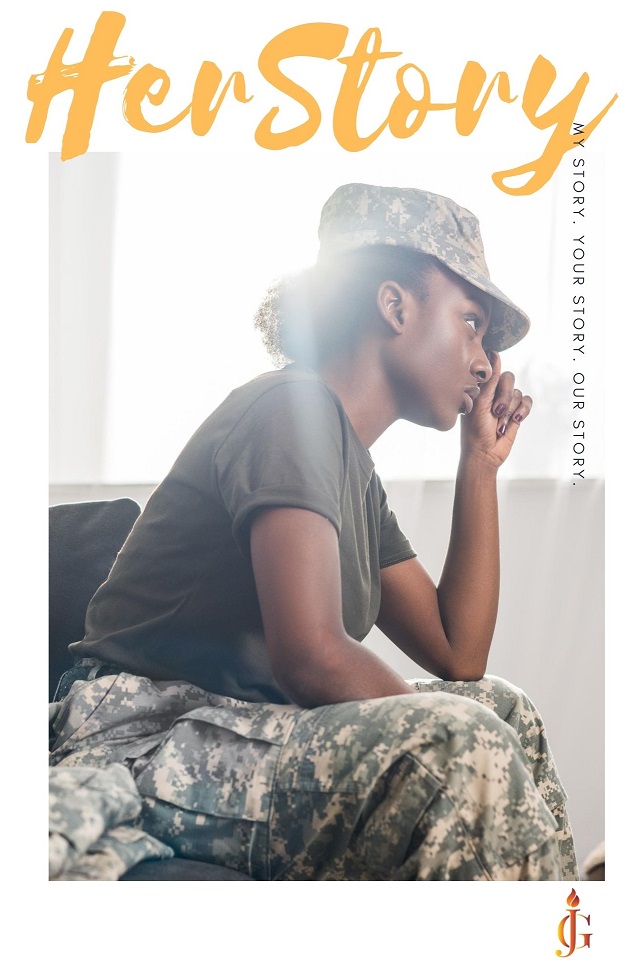25 Aug Invisible Wounds

When a woman encounters great tragedy and unbearable violence, she has the strength inside her to rise above as she, herself, is stronger than she may believe. That’s the case with Colonel Beverly Smith-Tillery, a retired U.S. Army veteran whom dedicated 23 years to serving her country as a critical care nurse and a nurse anesthetist. Her journey begins as a veteran of the Iraq-Afghanistan war treating some of our soldiers’ most horrific battleground wounds and takes her through a journey which transforms her entirely as she weathers the storm.
This career-military woman is still on a mission—a mission to change the fact that, on average, there are 20 suicide deaths per day among veterans, current service members and former National Guard or Reserve members.
“I want them to know there is hope,” she says. “I know because I walked that road. I have not made it to the end—you never make it to the end—but I have made it to a happy life. I have severe PTSD from my six years in the Iraq-Afghanistan war. But I don’t have nightmares every night, and I don’t cry about things that happened in the war every day.”
When she served at Landstuhl in Germany—a critical care facility—she and her team could expect three flights of 60 soldiers per day—180 souls with whom they developed intense but short-lived relationships. “In Germany we never knew what happened to them: Did they live or die? We didn’t keep them. It was fast in, fast out. The minute they could be transferred, they were medevaced.”
While stationed in Germany, Colonel Smith-Tillery was also injured in the line of duty: “I was pushing a gurney bearing a civilian contractor who had encountered a suicide bomber in Iraq. The weight of him, his bed, his equipment, ruptured disc in my neck and my arm was paralyzed.” She had surgery to insert a plate and screws and had a graft in her neck. Then surgery to remove kidney stones was terribly botched, and she nearly died of the complications.
Still, Colonel Smith-Tillery persevered on but further endured great horror. During visits to her doctor after that surgery, she was sexually assaulted. “I couldn’t work and take care of my soldiers,” she says. “I started drinking too much and had a lot of Oxy they gave me for pain. I didn’t have pain, but I took them anyway.”
She had nightmares, flashbacks, crying and depression.
“When I came home, I thought I’d be fine,” she says. “I was with my husband. I thought, ‘He’s my best support person.’ But I still had nightmares; I’d be beating him with my fist and scratching. I couldn’t breathe, my heart was racing, I was crying.”
She turned to the Veterans Administration (VA) and still had to continue use her most-inner strength to fight for her own survival. “I applied for help, and it took three months,” she says. “I thought, ‘I’ve worked in this system; I know how to navigate it.’ But it was a lot of work.” Work many other vets and service members are in need of but unable to access she says. “How many would fight for three months like I did? And when you’re horribly depressed or on the edge of suicide, you don’t have the energy to keep trying.”
The Colonel feels blessed to have worked with “a wonderful therapist,” who introduced her to writing and desensitization therapy, which would lead to one of the most amazing transformations.
“It was ‘Write about the most horrible incident you can think of.” Write. Talk, write more. I also learned relaxation techniques to deal with the tearfulness and shortness of breath. It was every week for five months with her.
“I’d dream about a soldier or incident that particularly disturbed me and couldn’t put it to rest. Phrases about those incidents would go through my head, and I starting putting the phrases on paper. Like ‘is it better if you go to war when you are young or old?’ And it evolved into poetry.”
She wrote about the Gaelic Canadian soldier. “I jokingly asked if he spoke Gaelic. ‘Yes,’ he said, I learned it on my Grammy’s knees when she would read me lullabies.’ I asked him to say something in Gaelic to me. ‘I’ll tell you what my Grammy said,’ he said and it translated to ‘Pour me another pint, matey.’ And we laughed, he and I. And he went home to Grammy. He’d lost both his legs. He was so handsome. He came back brave–but without his legs. And I felt overwhelming sorrow that I couldn’t get him back his legs.”
The Colonel has continued her writing and even won a gold medal in a national VA creative arts competition. She’s since published Invisible Wounds of War: My Redemption, a book of poetry, as a way to continue to help her fellow soldiers and veterans heal. The proceeds from sales of the book are given to two carefully vetted nonprofits. The first, Give an Hour, provides free and anonymous mental health care to vets and active duty service members.
“Anonymity is so important,” she says. “So many won’t get because it will impact their career. When I got help in Germany, I was punished by my command.”
The second, Hope for the Warriors, also provides mental health care as well as helping service members integrate back into civilian community and family adjustment assistance.
If you’d like to support these initiatives, the book is available for purchase in paperback or e-book editions through Amazon and Barnes and Noble. But if you or someone you know need the book, you can request a copy at woundsandredemption@gmail.com.
For more HERStory information, check out our Facebook Page and LinkedIn Page and subscribe to our newsletter below.
We want to hear your story. Your story is my story. Help us empower other women by sharing your story.

No Comments